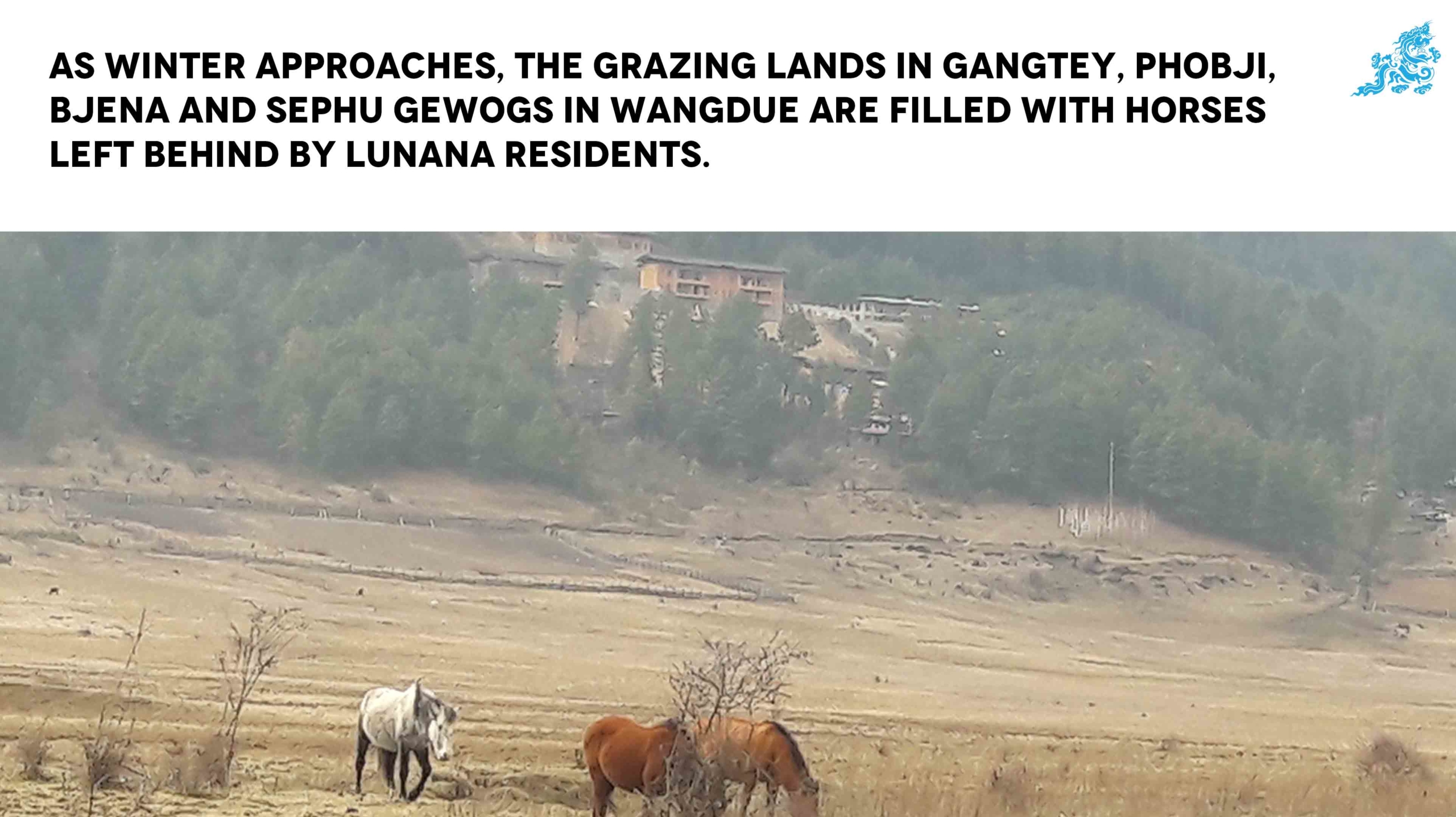Phurpa Lhamo | Wangdue
As winter approaches, the grazing lands in Gangtey, Phobji, Bjena and Sephu gewogs are filled with horses from Lunana gewog in Gasa.
To avoid the harsh temperature in Gasa, the Lunaps travel to lower lands with their animals in search of fodder and to restock their rations for the approaching winter.
While the Lunaps return home before the route closes due to the snowfall, the horses are left behind, often in the care of one or two locals.
This practice has become a major concern for the people in the four gewogs in Wangdue. The issue was also raised in the dzongkhag tshogdu (DT) held on April 30.
According to Bjena Gup Khandu, last year, horses were left in Khotokha village without consultation with the local leaders or the public.
He added that the issue had been raised multiple times and at one point also reached the court.
While 171 animals were found, one couldn’t be located. The men were ordered to pay Nu 6,667 each to the owner by the court.
The men were also sentenced to one year in prison for malicious mischief. The sentence was passed on March 9 this year. The involved men have appealed the case to the High Court and are awaiting judgment.
The local leaders stated that with large number of horses, the grazing grounds were damaged, the fodders weren’t enough for the local animals and also the horses damaged vegetables.
Sephu Gup Rinchen Penjor said that the horses from Lunana were kept near the school in Sephu, which posed risk to school-going students.
He added that all parents had to guide their students to school.
Further, as horses wandered on the roads, the travellers also face difficulty. “Vehicles of two teachers were hit by horses and the horses couldn’t be identified as there were many on the road,” Rinchen Penjor said
While Bjena gup requested that the animals be not allowed in the gewog, Sephu Gup said that the animals be allowed to stay in Sephu only for two days.
Rinchen Penjor said that Sephu was a route for the Lunaps to travel to lower lands to bring home rations.
He added that a specific time needed to be allocated for the travellers to pass and stay in Sephu.
Gangtey and Phobji gewogs are facing the same problem.
Lunap horses grazing in the two gewogs have given rise to the gewog’s feral dogs issue.
Gangtey Gup Gyeltshen said that in 2017, a notification was also issued stating that the horses from Lunana not be sent to the two gewogs. “However, instead of the number decreasing, I felt that the issue further escalated.”
The Gup also raised the issue of tsethar animals being released in Gangtey without prior notification or discussion. “When the animals die, the dogs feed on them.”
The increasing number of feral dogs in the gewog has posed risks to the students, elderlies and the domestic animals.
Meanwhile, Lunana Gup Kaka said that Lunaps couldn’t avoid bringing the horses to lower lands in winter.
He added that when the animals were left in gewogs in Wangdue, they were left in care of a few locals who received some kind of payment. “Horses are needed for us to bring our rations to the highlands. Horses are like vehicles for us.”
Further, Lunana Gup said that a way forward would be decided after the decision from the High Court.
What does the law state?
Speaking at the DT, Bhutan Agriculture and Food Regulatory Authority’s (BAFRA) Senior Regulatory and Quarantine officer, Gem Gyeltshen, said that for the horses to move from one area to another, a permit was necessary.
Further, a certificate to state that the animals are free of disease and had also received their required annual vaccines was also necessary.
Gem Gyeltshen said that to further decrease cattle-lifting practices, a letter from the local leaders with the name of the owner stating that the animals were permitted to move was also required.
Only then, would BAFRA release a permit.
In 2019, a meeting with the BAFRA and local leaders across Bhutan was held in Thimphu. There, the concern of tsethar animals being released in various locations was raised.
Gem Gyeltshen said that the issue was a national concern.
He added that for a tsethar animal to be released in one location, a no objection letter from the receiving gewog was also required.
The Livestock Rules and Regulations of Bhutan 2017 also sets a minimum standard for animal welfare.
However, these rules and regulations are practiced minimally on the ground.


